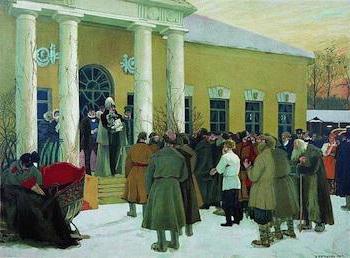The main goals of civil society are related to building a democratic state. Russia is also considered as such - it is prescribed in the Constitution.
Let us dwell on
what civil society is, the concept and signs of the rule of law.
The concept
The rule of law is a system of governing a country based on the rule of law and democracy. In it all are equal before the Law. It does not matter the social status, property qualification of a citizen, religion, gender. The main postulate is that all are equal before the Law and the court.
The main goal of civil society is to build such a state.
What happened before?
A striking example of the lack of equality in the legal situation is Russia during serfdom. Official laws of the country stated that for the same illegal actions, people from different social classes received different punishments. This tradition goes deep into antiquity. Even Russkaya Pravda, the first officially recorded written code of laws of Russia, contained articles that for the murder of a smerd (lower than average position) a more privileged relative was supposed to pay a fine (vira) less than for stealing a prince's horse. The death penalty was applied to the perpetrators of the death of a princely tyun or youth.

Of course, different punishments are provided now. For example, for causing harm to a policeman during execution, you can get a harsher punishment than for an ordinary citizen. But today we are dealing with job distinctions, and not with a social caste. A policeman, taking off his uniform, becomes an ordinary citizen, like everyone else, without special rights and privileges, unlike in the past.
The main goals of civil society are aimed at building a state in which everyone will be equal before the law. But similar ideas have already arisen in history. Socialist and communist views also called for general equality. But there are a number of differences.
Signs of the rule of law
In the socialist system, it is assumed that everyone is equal, but the development of the state is the highest value of society.
Personality as such should not exist. An individual is a cog in the huge mechanism of the state, which can be replaced without his consent, sent to another job, taken away property, called up for war, etc. The signs of a democratic state of law are:
- Modern civil society.
- Equality of all before the law and the court.
- Democratic elections.
- The main value is the personality, its rights and freedoms.
- State power is divided into independent legislative, executive and judicial.
Civil society: concept and features
Civil society is an integral part of the rule of law, which involves a society with developed economic, social, cultural, political relations.
It is based on three principles: personality, collective, state. This implies the main goals of civil society, which should be achieved in the state:
- Freedom of the individual, based on the observance of the rights and freedoms of the citizen and person, equality of opportunity by talents, and not by origin, the choice of each profession and creativity.
- The creation of collectives that defend the rights of each of its members: trade unions, public associations, political parties, labor collectives, to talk with the authorities on an equal footing, from a position of strength.
- Creation of a democratic state with freedom of speech, press, political pluralism. It should work for the interests of collectives and individuals, and not vice versa.
The main goals of civil society suggest that a person through association in collectives will defend his rights through various democratic institutions:
- Elections.
- Referenda.
- Stocks.
- Pickets.
- Public participation in discussions, etc.
Civil Society Example
A vivid example of a country with a developed civil society is France. It has a developed network of trade unions and labor collectives, which are united into a single whole. Any deterioration of the situation in the labor legislation - and millions of people immediately take to the streets. You can see flaming cars and broken windows, but this is rare. Basically, all events are held within the framework of the law. During the period of mass strikes, the situation worsens so much that the authorities are forced to take emergency measures.
A recent example of such actions was the mass protest of transport companies before the European Football Championship in 2016. The situation was so serious that FIFA even wanted to move the cup to another country. Fortunately, the authorities managed to negotiate with the unions.
Problems of building a civil society in Russia
Despite the fact that the topic "Civil Society" (9th grade, 11th grade, social studies, history) is being actively studied in institutes and the school, in Russia it does not develop properly. Elections to the State Duma in September 2016 showed a turnout of less than 50%. This indicates a low civil position in the country. It is believed that a developed society with an active civic stance gives an turnout of more than 60-70%.
Trade unions and labor collectives work poorly in our country. Over the past few years, the situation of workers has deteriorated significantly. The country has seen an increase in taxes, the introduction of new fees, etc. None of these episodes has been accompanied by mass demonstrations of many thousands. People defend their rights alone, on the principle of "my hut from the edge", but the main goals of civil society are the joint defense of citizens of their rights and freedoms by legal means.